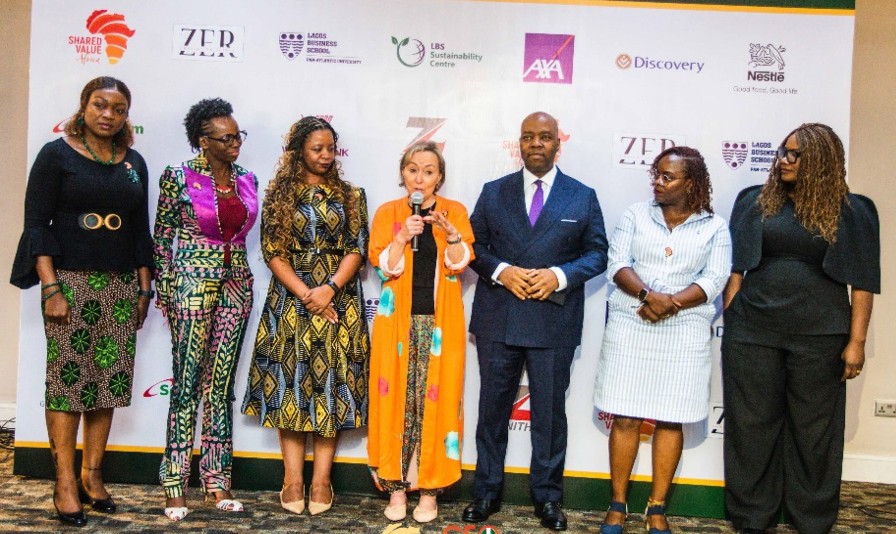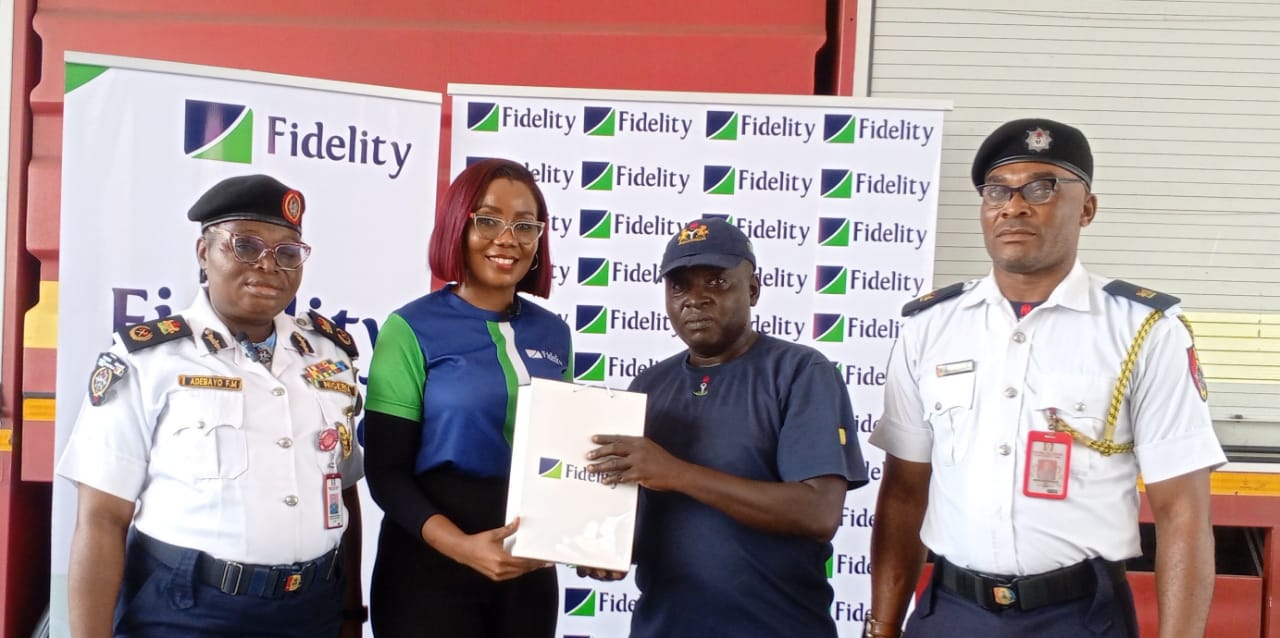Business
CEOs Brainstorm on Creating Shared Value for Sustainable Business Practice

Shared Value Africa (SVA), in collaboration with Lagos Business School Sustainability Centre and ZER Consulting Africa, proudly hosted the CEO Connect Forum Nigeria and the official launch of Shared Value Nigeria.
The event was convened to foster dialogue among CEOs and business leaders on integrating the Creating Shared Value (CSV) approach to sustainability as a fundamental business strategy in Nigeria and beyond.
The forum was held in person at The Wheatbaker Hotel in Ikoyi, Lagos on Wednesday, June 26, 2024, providing a unique opportunity for high-level business executives to engage and discuss leveraging societal challenges as avenues for business innovation and growth through the CSV framework. The event featured keynote addresses and discussions from esteemed local and continental leaders, who shared practical perspectives on embedding shared value into business operations.
Tiekie Barnard, CEO and Founder of Shift Impact Africa and Shared Value Africa set the tone of the forum. She emphasised that creating shared value can be a game changer for Africa. “Shared Value Africa was started six years ago with the aim of strategically addressing societal challenges through a business management concept developed by Professors Michael Porter and Mark Kramer at Harvard. Shared value is first and foremost about profitability and not CSR or philanthropy. Businesses should serve all stakeholders, not just shareholders, weaving its purpose around the intersection of people, profit, and planet,” she said. She added that, “The CSV approach can enhance reputation, attract investment, and is a long-term commitment to addressing societal issues. It is our dream at Shared Value Africa for every organisation on the continent to practise shared value.”
Adeolu Adewumi-Zer, Founder of ZER Consulting Africa and CEO, Shared Value Nigeria, spoke on ‘Value Creation as a Business Imperative.’ She shared her discovery of shared value three years ago, pointing how it connects profit with purpose. “Shared value offers a bridge to sustainable growth, providing long-term profitability while addressing societal needs. Launching Shared Value Nigeria will foster partnerships, enabling businesses to achieve success while improving the Nigerian society and economy.”
Rashidat Adebisi, Chief Client Officer at AXA Mansard, who were major sponsors, addressed the importance of responsibility towards future generations and stakeholders. She mentioned that at AXA Mansard, they have redefined their purpose to focus on inclusion and biodiversity. “One of the biggest challenges we should address is what do we leave for the next generation. How do we ensure that we are responsible for our stakeholders? At Axa Mansard we did rethink our purpose to ensure that we are doing what matters. Purpose is beyond making money for us, our purpose is hinged on two key pillars which are inclusion and biodiversity. We have run programmes with women like the SHE Initiative to ensure that our business accommodates more women and we are working with other organisations to create more shared value in critical sectors like healthcare,” she said. Programmes such as the SHE Initiative have demonstrated the value of including more women in business, increasing their participation from 15 to 34 percent. AXA Mansard continues to work with organisations to create more shared value in healthcare, defining, mapping, and partnering to ensure their activities create value.
Karen Basiye, Director of Sustainable Business and Social Impact at Safaricom delivered the first keynote speech themed, ‘The Business Case for Shared Value.’ She indicated that businesses can create shared value by leveraging resources and expertise to tackle societal challenges, resulting in mutual benefits. Examples from Safaricom include the mobile money initiative, M-PESA in Kenya which revolutionised digital mobile money payments and installing masts in refugee camps, both of which have driven profits and societal benefits. Safaricom also created a mobile health wallet for specific health savings, reinforcing the importance of responsibility towards people and the planet.
Jessica Chivinge, Chief Strategy and Commercial Officer at Vitality Health International, spoke through her presentation themed, ‘The Pursuit of Shared Value in the Health Sector.’ She highlighted Vitality’s approach to shared value through client, employee, and societal initiatives. She added that engaging employees to innovate and rewarding clients for healthy lifestyles were key strategies that unlocked value across the entire value chain.
The event concluded with an engaging Q&A session, where the audience interacted with the speakers and shared reflections, learnings and implementable actions. The CEO Connect Forum was proudly supported by AXA Mansard, Zenith Bank Plc, Wema Bank Plc, Unilever Nigeria and Nestlé Nigeria.
Lagos Business School is Africa’s leading management education institution and the LBS Sustainability Centre is a globally recognised knowledge hub that brings together the theory and practice on business and sustainability for the advancement of business performance and development outcomes. For more information about the initiatives and upcoming events by the Lagos Business School Sustainability Centre, please contact sustainabilitycentre@lbs.edu.ng. Together we can work towards a sustainable future for businesses on the continent. See our programmes at https://lbssustainabilitycentre.edu.ng/training
Shared Value Africa is the regional partner of the global Shared Value Initiative. Operated by Shift Impact Africa Group, a Shared Value consultancy, advocacy and training firm based in Johannesburg, its purpose is to grow the community of African Shared Value leaders. Shared Value Africa has been at the forefront of championing Creating Shared Value (CSV) on the continent via policies and practises that enhance the competitiveness of organisations while simultaneously advancing the economic and social conditions in the communities in which they operate. For more information, visit svai.africa.
Business
FirstBank Launches 500-Seater Bleacher at Carnival Calabar & Festival 2025

West Africa’s premier financial institution and financial inclusion services provider, FirstBank, has officially announced its sponsorship of the Carnival Calabar & Festival 2025, unveiling a landmark addition set to redefine the carnival experience — the first-ever private premium seating area at the event.
The highlight of FirstBank’s participation is the construction of a 500-seater premium bleacher, designed to provide comfort, safety, and an elevated viewing experience for carnival enthusiasts.
Speaking on the sponsorship, the Acting Group Head Marketing and Corporate Communications, FirstBank, Olayinka Ijabiyi, noted that the carnival aligns with the Bank’s First@Arts initiative, a platform dedicated to supporting the creative arts value chain across Nigeria. He said, “We recognise the transformative power of the arts, including carnivals, in inspiring people and strengthening national unity. For more than 131 years, we have supported platforms that promote self-expression, social reflection and cultural exchange. Our investment in the Carnival Calabar & Festival demonstrates our commitment to preserving the nation’s rich cultural heritage through First@Arts.”
“As part of our sponsorship this year, we are introducing the first-ever private 500-seater premium bleacher to further elevate the carnival experience. This exclusive seating is designed to provide exceptional comfort and an unforgettable viewing experience for attendees,” Ijabiyi added.
The Chairman of the Cross River State Carnival Calabar Commission, Gabe Onah, also commented on FirstBank’s sponsorship. “FirstBank’s involvement is a strong demonstration of private-sector support for culture and tourism. This partnership not only enhances the overall quality of the carnival but also strengthens its global appeal,” he said.
The Carnival Calabar & Festival 2025 is officially marketed by Okhma Global Limited, the appointed Official Marketer responsible for brand partnerships, promotional engagements, and ticket sales. Okhma Global Limited has partnered with the Cross River State government in delivering Carnival Calabar & Festival for over ten years, playing a key role in strengthening the carnival’s commercial growth and global visibility.
Business
Yuletide: Ecobank Urges Vigilance, Guarantees Seamless Banking

Ecobank Nigeria, a member of Africa’s leading pan-African banking group, has assured customers of uninterrupted access to banking services throughout the year-end holiday period via its secure and robust digital platforms. The Bank also urged customers to remain vigilant against fraud and scams during the festive season.
Speaking on the development, Victor Yalokwu, Head, Products & Analytics, Consumer & Commercial Banking, Ecobank Nigeria, said the Bank’s digital channels — including the Ecobank Mobile App, Ecobank Business App, USSD *326#, Ecobank Online, OmniPlus, Omnilite, EcobankPay, RapidTransfer, Ecobank Cards, ATMs, PoS terminals, and over 35,000 Ecobank Xpress Point (Agent Banking) locations nationwide — will remain fully available to support customers throughout the yuletide and year-end holiday period.
He noted that customers will continue to enjoy a wide range of services during the period, including local and international funds transfers, bill payments and airtime top-ups, merchant payments, balance inquiries and account statements, as well as cardless cash withdrawals via ATMs.
According to Yalokwu, “Ecobank encourages customers to leverage these digital solutions for safe, fast, and efficient banking, especially during the festive season when convenience and reliability are essential. While physical branch operations may be subject to adjusted working hours in line with public holidays, customers can be assured that Ecobank’s digital platforms are designed to deliver uninterrupted service and enhanced security at all times. Ecobank remains committed to providing innovative financial solutions and exceptional customer service, and we wish all our customers a joyful festive season and a prosperous New Year.”
Yalokwu also cautioned customers to remain vigilant against fraudsters and scammers during the period. “Before you wrap up the year, tighten your security. December brings online sales, travel, and year-end distractions—this is exactly when scammers are most active. From fake festive deals to cloned merchant sites and suspicious messages, staying vigilant helps keep your money safe.”
He advised customers to shop only on trusted websites, never share their PINs, passwords, or one-time passwords (OTPs), avoid banking on public Wi-Fi networks, be cautious of urgent or emotionally charged messages, and regularly review their account activity.
Business
Fidelity Bank Donates Hoses, Water Pumps to Fire Service

Fidelity Bank Plc has donated firefighting and preventive equipment, including hoses and gasoline-powered water pumps, to the Ikoyi Fire Service Station in Lagos, reinforcing efforts to improve emergency response and promote community safety.
The donation was executed under the Fidelity Helping Hands Programme (FHHP) by the bank’s True Serve team. Through the initiative, Fidelity Bank employees identify critical community needs, raise funds, and receive matching financial support from the bank to implement impact-driven projects.
Speaking on the initiative, Divisional Head, Brand and Communications Division at Fidelity Bank, Dr Meksley Nwagboh, said the intervention reflects the bank’s commitment to public safety, environmental protection, and sustainable community development.
“Community safety is a shared responsibility. Fidelity Bank remains committed to supporting initiatives that protect lives, property, and the environment,” Nwagboh said, adding that preventive measures remain more effective than emergency responses.
He noted that providing the right tools to first responders aligns with the bank’s broader goal of enabling people to live safe, meaningful, and empowered lives.
Lagos State Controller of the Federal Fire Service, Controller of Fire (CF) Funke Adebayo, commended Fidelity Bank for the timely support, particularly as the festive season approaches amid dry weather conditions that heighten fire risks.
She urged residents to remain vigilant and warned parents against allowing children to handle fireworks during celebrations, stressing that careless handling of fire could lead to avoidable disasters.
Adebayo also disclosed that the Fire Service has intensified sensitisation visits to corporate organisations to promote fire safety and discourage unsafe practices.
Also speaking, Area Commander, Onikan Fire Station, Chief Superintendent of Fire (CSF) Oswere Michael, expressed appreciation for the donation, noting that it would strengthen the station’s operational capacity.
He encouraged households, businesses, and community members to prioritise fire safety, describing collective responsibility as critical to preventing fire outbreaks.
Fidelity Bank Plc is a full-fledged commercial deposit money bank serving over 9.1 million customers through its digital platforms, 255 business offices across Nigeria, and its UK subsidiary, FidBank UK Limited. The bank has received multiple local and international awards in recognition of its performance in digital transformation, MSME banking, and innovative financial services.
Photo – L-R: Lagos State Controller, Federal Fire Service, CF (Controller of Fire), Adebayo Funke; Tolulope Rojaiye, Marketing Business Partner, Fidelity Bank Plc; Assistant Superintendent of Fire, Ishola Folorunsho Olufemi; and Station Commander, Onikan Fire Station, Lagos, Okeke Ferdinand; during the donation of firefighting equipment to the Federal Fire Service at Ikoyi, Lagos, recently.






